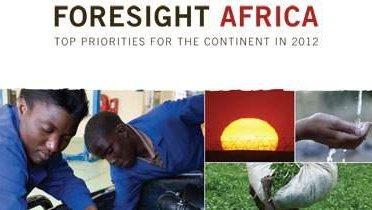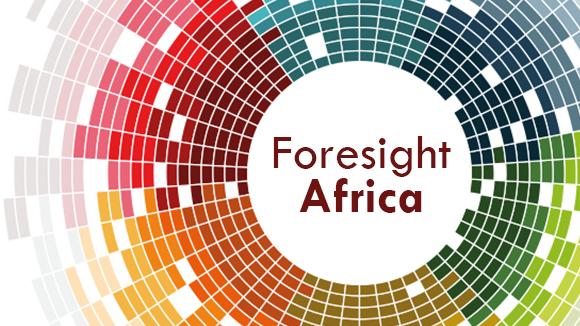What do you think Africa’s top priorities for 2012 should be? Join the conversation on Twitter using the #ForesightAfrica hashtag.
This past year, Africa and the rest of the world witnessed many significant events that have created consequential challenges for the future of Africa and the global economy. Most notably, these included the economic slowdown in Europe and the United States, the Arab Spring in the Middle East and North Africa, instability and unrest in a number of Sub-Saharan African countries, and severe drought and famine in the Horn of Africa. While 2011 has certainly proven to be difficult for Africa and other regions, there were also developments that have helped many African countries manage the negative impacts of these challenges. These developments included: high commodity prices, which helped boost trade returns in Africa’s commodity-rich countries; economic and governance reforms in several African states, which helped strengthen democratic rights and improve livelihoods; and a deepening of regional integration efforts, which helped stimulate growth across the continent.
Looking at 2012, experts from the Brookings Africa Growth Initiative (AGI) and colleagues from think tanks based in the region have come together to produce this year’s issue of Foresight Africa, where they outline the top priorities for the continent for 2012 and beyond. AGI scholars assess what they see as the major challenges for Africa in the coming year and provide policy recommendations on how to manage these challenges and leverage opportunities to catalyze and reignite growth in 2012. Similarly, AGI and its partner think tanks identify country-specific challenges in Nigeria, South Africa, Senegal and Kenya.
Country Snapshot South Africa: Economic Growth, Poverty and Inequality
Securing a Productive South Sudan
John M. Mbaku and Jessica Smith assess forthcoming challenges for South Sudan in 2012. They recommend a broad set of policy interventions to help South Sudan manage the common pool resources of water and oil.
Downloads:
Minimizing the Impact of the Global Economic Slowdown on Africa
Julius Agbor and Anne Kamau analyze the impacts of the global economic slowdown on Sub-Saharan Africa and discuss what African governments can do to better handle the ups and downs of global markets and the macroeconomic environment in 2012.
Downloads:
Strategies for Improving Food Security in Africa
Vera Songwe examines the burden posed by constant fluctuations in food prices on African farmers. Songwe explores how implementing communal storage warehouses for food and agricultural products can help mitigate problems of food price volatility and identifies the next steps for African governments and the private sector.
Downloads:
Insecurity and Counter-Insurgency in Africa
Richard Joseph reviews the threats stemming from the statelessness of Somalia, the need for political reconfiguration in Sudan, and the potential for conflict in Nigeria.
Downloads:
Country Snapshot Senegal: Strategies to Integrate Youth into the Labor Market
Country Snapshot Nigeria: Key Policy Priorities to Unlock Growth Potential
Country Snapshot Kenya: The Make or Break Year
China-Africa Relations: Defining New Terms of Engagement
Vera Songwe and Nelipher Moyo examine the China-Africa relationship. They argue that in 2012 African countries must articulate a comprehensive China policy that goes beyond trade to include issues of industrialization, agriculture, labor markets and politics.
Downloads:
Consolidating Africa's Regional Integration Efforts
Mwangi S. Kimenyi and Stephen N. Karingi suggest that regional integration has the potential to achieve significant progress in 2012 if African governments and regional economic communities can increase coordination.
Downloads:
Sub-Saharan Africa's Youth Bulge: A Demographic Dividend or Disaster?
Julius Agbor, Olumide Taiwo and Jessica Smith analyze the implications of the growing youth population in Sub-Saharan Africa. They emphasize that African governments must heed the example set by the youth-led Arab Spring and push for greater inclusion of young people into their economies to avoid political instability in their own countries.
Downloads:
Enhancing Africa's Voice in Global Governance
Mwangi S. Kimenyi and Nelipher Moyo discuss Africa’s need for further inclusion in global governance, as decisions made by the developed world have large implications for the continent. They outline recommendations for Africa to increase its voice and influence in global governance, stressing the need for a more inclusive framework to address the world’s problems.
Downloads:
A New Agenda for Aid to Africa
John Page stresses that 2012 is likely to be a year in which aid to Africa will fall and a new aid agenda will be needed. Page argues that after years of neglect donors need to focus on creating good jobs in Africa by shifting away from low impact regulatory reforms toward addressing the binding constraints to Africa’s competitiveness.
Downloads:
The Brookings Institution is committed to quality, independence, and impact.
We are supported by a diverse array of funders. In line with our values and policies, each Brookings publication represents the sole views of its author(s).




